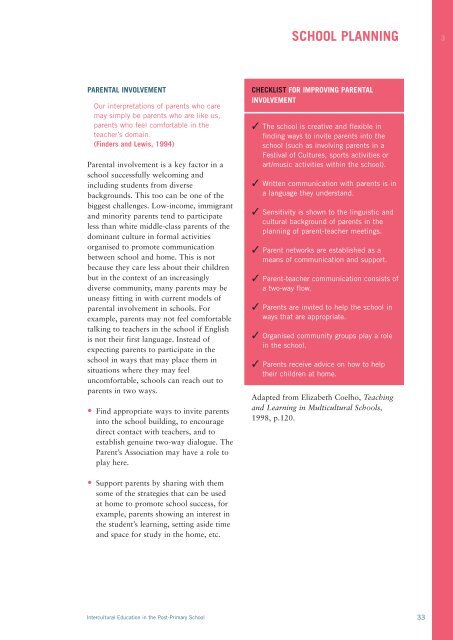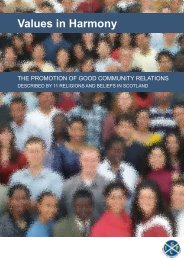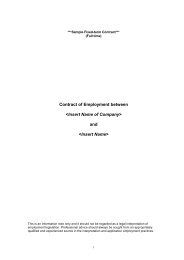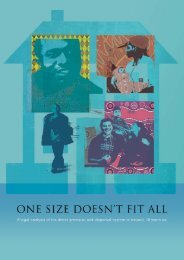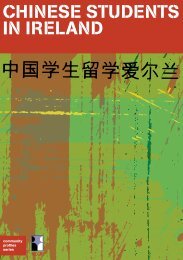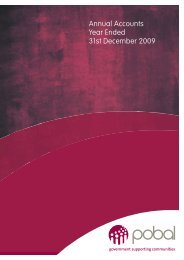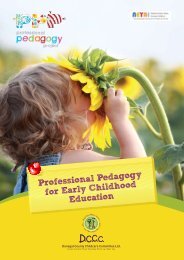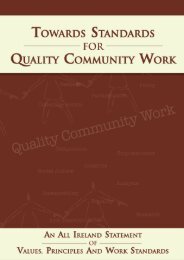Important <strong>in</strong>formation <strong>in</strong>cludes• <strong>the</strong> correct pronunciation of <strong>the</strong>ir name(be<strong>in</strong>g able to pronounce a student’sname as it is used by <strong>the</strong>ir family orguardians correctly, without shorten<strong>in</strong>git or us<strong>in</strong>g nicknames, is important <strong>in</strong>affirm<strong>in</strong>g to <strong>the</strong>m and to o<strong>the</strong>r pupilsthat <strong>the</strong>y belong and that <strong>the</strong>ir language,while different, is accepted)• <strong>the</strong>ir language abilities and needs (<strong>in</strong>many countries it is normal for peopleto have two or three languages)• a few key words <strong>in</strong> <strong>the</strong>ir first language,if possible (hello, welcome, well done/very good, please/ thank you, jo<strong>in</strong> <strong>in</strong>,stop, etc.)• <strong>the</strong>ir religion, a basic understand<strong>in</strong>g ofhow <strong>the</strong>y practice it (not all members ofany given religion will practice <strong>the</strong>irreligion <strong>in</strong> <strong>the</strong> same way), and whe<strong>the</strong>rthat has implications for classroomplann<strong>in</strong>g (for example, whe<strong>the</strong>r physicalcontact between pupils might be deemed<strong>in</strong>appropriate <strong>in</strong> Drama or PE, whe<strong>the</strong>rproduc<strong>in</strong>g representations of <strong>the</strong> humanbody or religious symbols may be<strong>in</strong>appropriate <strong>in</strong> Visual Arts, whe<strong>the</strong>r popmusic might be <strong>in</strong>appropriate <strong>in</strong> Music)• whe<strong>the</strong>r <strong>the</strong>re are any subjects <strong>the</strong>student will not be tak<strong>in</strong>g (<strong>the</strong><strong>Education</strong> Act does not ‘require anystudent to attend <strong>in</strong>struction <strong>in</strong> anysubjects which is contrary to <strong>the</strong>conscience of <strong>the</strong> parent of <strong>the</strong> studentor <strong>in</strong> <strong>the</strong> case of <strong>the</strong> student who hasreached 18 years, <strong>the</strong> student’. Inaddition, <strong>the</strong> student may, under somecircumstances, be exempt from learn<strong>in</strong>gIrish under <strong>the</strong> Department of <strong>Education</strong>and Science’s Circular 10/94).CHECKLIST: WHAT INFORMATION SHOULD BEGATHERED WHEN A NEW STUDENT COMESINTO THE SCHOOL?How are <strong>the</strong> names of <strong>the</strong> student and<strong>the</strong>ir parents correctly pronounced?What language(s) does <strong>the</strong> student have,and what is <strong>the</strong>ir level of proficiency <strong>in</strong><strong>the</strong>se language(s)?How does one say some key phrases <strong>in</strong><strong>the</strong> student’s first language, such as agreet<strong>in</strong>g, ‘please/thank you’, ‘jo<strong>in</strong> <strong>in</strong>’,‘stop’, ‘well done/very good’ etc?Are <strong>the</strong>re subjects <strong>the</strong> student will not betak<strong>in</strong>g and what will <strong>the</strong>y be do<strong>in</strong>g dur<strong>in</strong>gthose times?Are <strong>the</strong>re any cultural practices thatmight affect classroom <strong>in</strong>teraction?Are <strong>the</strong>re actions which are deemed<strong>in</strong>appropriate or rude <strong>in</strong> <strong>the</strong> student’shome culture but which may not causeoffence to members of <strong>the</strong> dom<strong>in</strong>antethnic group, or vice versa (show<strong>in</strong>gsomeone an open palm or <strong>the</strong> soles of <strong>the</strong>foot may be rude <strong>in</strong> some cultures; achild mak<strong>in</strong>g eye contact with an adultmay be rude <strong>in</strong> some African cultureswhile <strong>in</strong> Traveller culture children oftenspeak very directly and openly to adults,someth<strong>in</strong>g which is sometimes seen asrude <strong>in</strong> schools; stand<strong>in</strong>g close to aperson may be deemed rude <strong>in</strong> somecultures, while it may be normal <strong>in</strong>o<strong>the</strong>rs, etc.)?How is teach<strong>in</strong>g <strong>the</strong> student <strong>the</strong> cultureof <strong>the</strong> school to be handled?What is <strong>the</strong> student’s religion, how is itpractised, and has this any implicationsfor classroom plann<strong>in</strong>g?Will <strong>the</strong>re be specific issues for studentsconcern<strong>in</strong>g, food, jewellery or cloth<strong>in</strong>g(for example, <strong>the</strong> range of tastes cateredfor by <strong>the</strong> school canteen or <strong>the</strong>symbolism of <strong>the</strong> school crest on <strong>the</strong>school uniform)?32<strong>Intercultural</strong> <strong>Education</strong> <strong>in</strong> <strong>the</strong> <strong>Post</strong>-<strong>Primary</strong> <strong>School</strong>
SCHOOL PLANNING 3PARENTAL INVOLVEMENTOur <strong>in</strong>terpretations of parents who caremay simply be parents who are like us,parents who feel comfortable <strong>in</strong> <strong>the</strong>teacher’s doma<strong>in</strong>.(F<strong>in</strong>ders and Lewis, 1994)Parental <strong>in</strong>volvement is a key factor <strong>in</strong> aschool successfully welcom<strong>in</strong>g and<strong>in</strong>clud<strong>in</strong>g students from diversebackgrounds. This too can be one of <strong>the</strong>biggest challenges. Low-<strong>in</strong>come, immigrantand m<strong>in</strong>ority parents tend to participateless than white middle-class parents of <strong>the</strong>dom<strong>in</strong>ant culture <strong>in</strong> formal activitiesorganised to promote communicationbetween school and home. This is notbecause <strong>the</strong>y care less about <strong>the</strong>ir childrenbut <strong>in</strong> <strong>the</strong> context of an <strong>in</strong>creas<strong>in</strong>glydiverse community, many parents may beuneasy fitt<strong>in</strong>g <strong>in</strong> with current models ofparental <strong>in</strong>volvement <strong>in</strong> schools. Forexample, parents may not feel comfortabletalk<strong>in</strong>g to teachers <strong>in</strong> <strong>the</strong> school if Englishis not <strong>the</strong>ir first language. Instead ofexpect<strong>in</strong>g parents to participate <strong>in</strong> <strong>the</strong>school <strong>in</strong> ways that may place <strong>the</strong>m <strong>in</strong>situations where <strong>the</strong>y may feeluncomfortable, schools can reach out toparents <strong>in</strong> two ways.• F<strong>in</strong>d appropriate ways to <strong>in</strong>vite parents<strong>in</strong>to <strong>the</strong> school build<strong>in</strong>g, to encouragedirect contact with teachers, and toestablish genu<strong>in</strong>e two-way dialogue. TheParent’s Association may have a role toplay here.CHECKLIST FOR IMPROVING PARENTALINVOLVEMENTThe school is creative and flexible <strong>in</strong>f<strong>in</strong>d<strong>in</strong>g ways to <strong>in</strong>vite parents <strong>in</strong>to <strong>the</strong>school (such as <strong>in</strong>volv<strong>in</strong>g parents <strong>in</strong> aFestival of Cultures, sports activities orart/music activities with<strong>in</strong> <strong>the</strong> school).Written communication with parents is <strong>in</strong>a language <strong>the</strong>y understand.Sensitivity is shown to <strong>the</strong> l<strong>in</strong>guistic andcultural background of parents <strong>in</strong> <strong>the</strong>plann<strong>in</strong>g of parent-teacher meet<strong>in</strong>gs.Parent networks are established as ameans of communication and support.Parent-teacher communication consists ofa two-way flow.Parents are <strong>in</strong>vited to help <strong>the</strong> school <strong>in</strong>ways that are appropriate.Organised community groups play a role<strong>in</strong> <strong>the</strong> school.Parents receive advice on how to help<strong>the</strong>ir children at home.Adapted from Elizabeth Coelho, Teach<strong>in</strong>gand Learn<strong>in</strong>g <strong>in</strong> Multicultural <strong>School</strong>s,1998, p.120.• Support parents by shar<strong>in</strong>g with <strong>the</strong>msome of <strong>the</strong> strategies that can be usedat home to promote school success, forexample, parents show<strong>in</strong>g an <strong>in</strong>terest <strong>in</strong><strong>the</strong> student’s learn<strong>in</strong>g, sett<strong>in</strong>g aside timeand space for study <strong>in</strong> <strong>the</strong> home, etc.<strong>Intercultural</strong> <strong>Education</strong> <strong>in</strong> <strong>the</strong> <strong>Post</strong>-<strong>Primary</strong> <strong>School</strong>33


